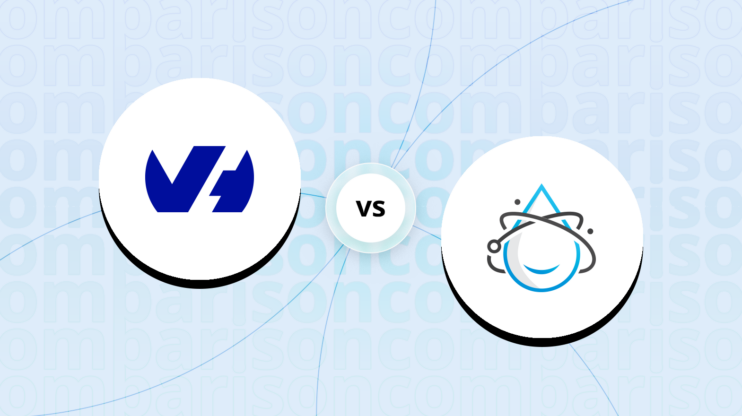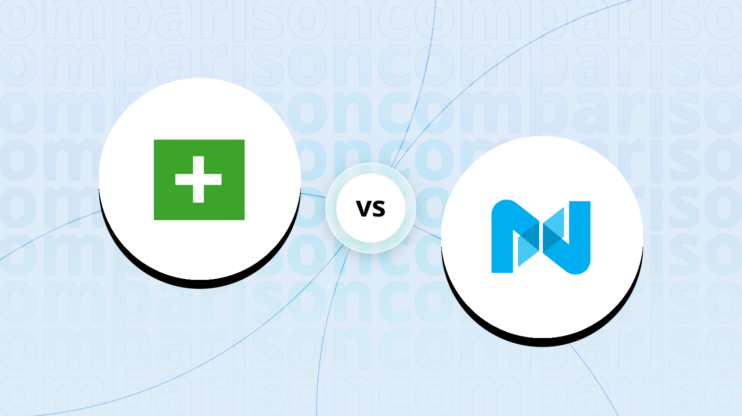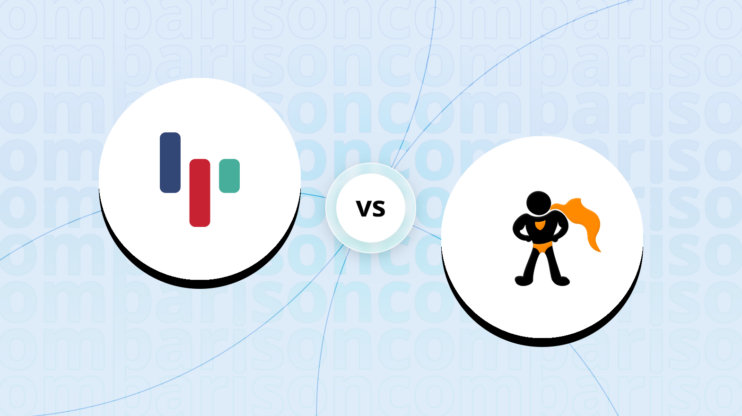Namecheap vs Netim: Final verdict
Looking over Namecheap vs. Netim, both offer unique advantages suitable for different types of users and hosting needs.
-
Namecheap (Overall grade: 7.2)
offers a versatile range of hosting plans including shared, cloud, VPS, and dedicated hosting. Its strengths lie in its 100% uptime guarantee for specific plans, an average uptime of 99.96%, and a response time of 1.05 seconds. Key benefits include free SSL for the first year, a comprehensive 30-day money-back guarantee, and 24/7 live chat support. However, it does face criticisms over inconsistent response times and occasional performance fluctuations. Despite these minor setbacks, Namecheap’s diverse offerings, scalability options, and extensive security measures make it a solid choice for various hosting needs.
Netim (Overall grade: 6.9)
offers shared and WordPress hosting but lacks cloud, VPS, and dedicated options. It provides practical features like SSD storage, unlimited traffic, and Let’s Encrypt SSL certificates. Netim excels with user management through its custom control panel, Netim Direct, which allows for precise role-based access control. However, its limited support hours and lack of a website builder might be limiting for some users. Despite the simplified layout and helpful documentation, Netim’s more restrained feature set and restricted customer support hours make it less robust compared to Namecheap. Nevertheless, Netim remains an affordable and structured option for users with targeted hosting requirements.
 Overall grade:7.2 |
 Overall grade:6.9 |
|
|---|---|---|
| Uptime and Availability | 8.0 | 9.1 |
| Hosting Performance | 8.2 | 4.8 |
| Hosting Security | 8.5 | 8.5 |
| Price | 8.7 | 8.7 |
| Hosting Features | 7.5 | 2.8 |
| Ease Of Setup | 8.8 | 8.2 |
| User Management | 0.0 | 6.7 |
| Customer Support | 8.0 | 6.4 |
| User feedback | 4.3/5 | 4.5/5 |
Hosting types offered
Both platforms provide a variety of hosting types, each designed to meet the different needs of users.
 |
 |
|
|---|---|---|
| Shared hosting | ||
| Cloud hosting | ||
| WordPress hosting | ||
| Ecommerce hosting | ||
| VPS hosting | ||
| Dedicated hosting |
Although both offer a variety of hosting plans tailored to different needs, in
certain cases, one platform may prove to be more suitable.
Detailed comparison
Uptime and availability
Evaluates the average uptime statistics, uptime guarantee and overall availability of the hosting
provider
Score Components:
- Uptime percentage (30%): evaluates the uptime statistics in given period of time
- Uptime guarantee (20%): Assesses if the platform offers an uptime guarantee and
whether the actual uptime matches the promised guarantee. - General performance (25%): Evaluates how fast is the average response time and overall
it’s stability. - Responsiveness (10%): Adaptability to different devices and screen sizes.
- Availability (25%): Reflects the total downtime and number of outages.
 8.0
8.0
 9.1
9.1
Winner Namecheap: A versatile option with strong uptime guarantees across various hosting plans.

Namecheap offers a 100% uptime guarantee for its shared, business, and dedicated server accounts and a 99.9% guarantee for its reseller and VPS accounts. Though recent tests showed a slight drop with 31 minutes of downtime, its average uptime remains strong at 99.96%. Response time averages around 1.05 seconds, which meets industry standards. Customers benefit from monitoring support using tools like StatusCake and Uptime.com, with potential compensation for confirmed downtime.

Despite these solid features, Namecheap’s response time could be faster compared to some competitors. While most uptime guarantees are excellent, recent performance fluctuations underscore the need for continuous monitoring. For users requiring near-perfect performance, these factors should be taken into account when making a decision. Although Namecheap remains a strong contender, it’s essential to weigh these aspects against personal hosting needs.
Which one has better hosting performance?
Score Components:
- Hosting speed (30%): This includes SSD quality, Load times, PageSpeed score ranges,
additional information on website speed, built-in plugins for performance enhancement, available caching
methods, and CPU/RAM options - CDN (20%): Considers whether CDN is available or not, whether it’s free or paid, and
the quality of the CDN service - Available data centers (30%): Evaluates the number of data centers and their locations
globally. - Scalibility (20%): Looks at whether elastic scaling is available, the process required
to scale (manual upgrade vs. automatic scaling), the presence of dedicated servers, and the costs
associated with scaling.
 8.2
8.2
 4.8
4.8
🏆 Winner
Namecheap: Excellent hosting performance with multiple features.
When it comes to general performance, Namecheap outshines Netim significantly. Namecheap’s hosting speed benefits from SSD quality across all plans, boasting fully-loaded times of 0.7 seconds and reduced time to first byte. Additionally, Namecheap offers 99.9% uptime across all hosting plans. In contrast, Netim’s general speed performance is not specified as precisely. Namecheap includes a free CDN in its WordPress plans, whereas Netim’s rates and CDN availability aren’t mentioned. Namecheap’s data centers are located in the US, UK, and EU, while Netim’s servers are solely based in France.
Website Speed
Namecheap’s website speed dominates with a fully-loaded time of 0.7 seconds and TTFB of 192 milliseconds, highlighting its faster page speed compared to traditional hosting. In contrast, Netim’s website speed metrics such as load times and page speed are not clearly articulated. Furthermore, automatic backups and built-in performance enhancements in Namecheap’s plans give it an edge.
Scalability
Scalability for Namecheap involves straightforward upgrading of plans as needed, from shared hosting to powerful VPS options, including dedicated servers. Disk space and bandwidth can be expanded significantly within each tier. The exact costs for scaling are not detailed. On Netim’s side, scalability is also reliant on upgrading plans. Information about the availability of dedicated servers and the costs associated with scaling are not specified.
Which one has better security features?
and regulatory requirements
Score Components:
- Technical security measures (40%): This includes encryption, firewalls, DDoS
protection, secure configurations, server monitoring, access control and availability of security addons
(e.g Sitelock security). - Operational security measures (30%): Encompasses data privacy, backups and data
redundancy. - Compliance and certifications (20%): Adherence to legal and regulatory requirements
(e.g., GDPR, HIPAA) and possession of certifications (e.g., ISO 27001, SOC 2). - Business and reliability (10%): Factors in the provider’s reputation, uptime
guarantees, and customer support.
 8.5
8.5
 8.5
8.5
🏆 Winner Namecheap: Offers robust security features with extensive options for SSL certificates and advanced protection.
Both Namecheap and Netim, have notable differences in their approaches to technical and operational
security, as well as in their compliance with regulations.
Technical security measures:
Namecheap provides a diverse range of SSL certificates, including DV, OV, and EV certificates, suitable for varying levels of security needs. It also supports multiple PHP versions from 5.X to 8.X, giving more flexibility for different web applications. Netim, on the other hand, includes Let’s Encrypt DV SSL certificates in all plans and supports the latest PHP versions like 8.3. While both support PHP versions and offer SSL certificates, Namecheap offers more granular choices and additional security layers like eAccelerator and xCache.
Operational security measures:
Both Namecheap and Netim provide two-factor authentication (2FA), which adds an extra layer of account security. Namecheap has features such as IP Deny Manager and Leech Protect to defend against brute-force attacks, as well as various email authentication systems. Meanwhile, Netim offers Anti-DDoS services, Web Application Firewall (WAF), and log-in alerts, focusing on mitigating threats like DDoS attacks. Netim’s operational measures are robust, but Namecheap’s extensive set of tools like ClamAV™ Virus Scanner and BoxTrapper for spam protection gives it a broader security map.
Compliance and certifications:
Namecheap and Netim both comply with GDPR. Namecheap provides various rights under GDPR, including the right to be forgotten and to restrict processing. Netim guarantees GDPR compliance with all data hosted in France. Both offer protection measures that enable users to meet PCI compliance requirements, although PCI compliance is not explicitly confirmed for either. HIPAA compliance is not specified for both hosting services.
 |
 |
|
|---|---|---|
SSL certificate |
Multiple types (DV, OV, EV, Wildcard, etc.) |
Let’s Encrypt DV, Sectigo (DV, EV, Wildcard, etc.) |
Additional security features |
2FA, Spam protection, Virus Scanner, etc. |
Anti-DDoS, WAF, log-in alerts, etc. |
PHP versions |
PHP 5.X to PHP 8.X |
Latest PHP versions including 8.3 |
GDPR compliance |
Yes |
Yes |
HIPAA compliance |
Not specified |
Not specified |
PCI compliance |
Not specified |
Not specified |
Hosting features
Score Components:
- Domains (20%): Assesses the availability of a free domain, domain purchase options, and
pricing - Email (15%): Considers if the provider offers full email hosting, or is reselling
third-party service, and if the email is only transactional or not - Website builder (15%): Checks if website builder is available, and it’s user
friendliness and overall the level of customization allowed. - Staging environment (20%): Determines if a staging environment is available, allowing
for testing changes before going live. - FTP & SFTP accounts (10%): Evaluates if and how easily users can access FTP and
SFTP accounts - Git and SSH access (20%): Assess whether Git is integrated into the hosting service and
if SSH access is provided
 7.5
7.5
 2.8
2.8
🏆 Winner: Namecheap: A feature-rich hosting provider offering affordable and versatile plans.
Namecheap provides a range of hosting plans that cater to different user needs, making it a strong choice for many. Its shared hosting plans are equipped with an intuitive website builder, numerous SSL certificates, and robust email hosting features. For those interested in more advanced customization, Namecheap offers cPanel integration and support for multiple programming languages. Unique selling points such as free website migration and a 30-day money-back guarantee add value, while the availability of WordPress-specific plans with various enhancements ensures that beginners and experienced users alike find a fitting solution. Namecheap’s user-friendly interface, coupled with 24/7 live support, ensures smooth navigation and prompt issue resolution.
Netim, on the other hand, offers a simpler feature set, clearly outlined through its various plans. It provides SSD storage, unlimited traffic, and the latest PHP and MySQL versions. However, it falls short in some areas, such as the lack of an integrated website builder and limited customer support hours. Netim includes Let’s Encrypt DV SSL certificates for all plans and offers Sectigo certificates for those seeking higher security levels. Free backups with a rolling 7-day period provide essential data protection. Despite these built-in features, Netim’s email and database capacities are more restricted compared to Namecheap’s extensive offerings.
 |
 |
|
|---|---|---|
Free domain |
Yes, for the first year |
No |
Free SSL |
Yes, for the first year |
Yes, Let’s Encrypt DV |
Email hosting |
Yes |
Yes |
Website builder |
Yes |
No |
Staging environment |
Yes |
Not mentioned |
FTP & SFTP accounts |
Yes |
Not mentioned |
Git and SSH access |
Yes |
Not mentioned |
Free backup |
Yes |
Yes |
Money back guarantee |
Yes, 30 days |
Not mentioned |
Both providers support a range of users from beginners to experts with user-friendly website builders and WordPress staging areas. However, in terms of developer tools, both Namecheap and Netim offer robust options including SSH access, support for multiple programming languages, and Git for version control, thus appealing to developers looking for advanced capabilities.
Email services:
Email services at Namecheap excels with its generous allowance for email accounts, especially in its higher-tier plans. It offers a range of email features, including autoresponders, spam protection, and support for various webmail services. Netim, while providing email services with all its plans, limits the number and storage capacity of email addresses based on the chosen plan. Namecheap’s capability to handle unlimited email accounts in some plans and its comprehensive spam protection make it more versatile for high-demand scenarios. Both providers offer transactional email capabilities, but Namecheap’s more extensive services give users greater flexibility. Neither appears to offer reselling of third-party email services directly within the hosting plans.
Price
Score Components:
- Plan value (40%): What each pricing tier offers.
- Transparency and clarity (30%): Clearness of pricing structures.
- Flexibility of plans (20%): Range of options to suit different budgets.
- Hidden costs (10%): Additional expenses not included in the plan.
 8.7
8.7
 8.7
8.7
🏆 Winner Namecheap:Offers competitive pricing and features, such as free domain names, free SSL installation, and a strong combination of shared and managed WordPress hosting plans.
Evaluating the pricing of plans among various hosting providers can be complex due to their differing pricing and renewal strategies. Additionally, certain plans require annual commitments, which adds to the difficulty of making comparisons. The prices listed are based on monthly commitments; plans requiring annual commitments are indicated. Additionally, although some providers offer identical plans for WordPress and shared hosting, we have created separate tables for each to enhance clarity.
Namecheap and Netim both offer a range of plans for shared, WordPress, and other hosting types. Namecheap’s Shared Hosting plans begin at $1.98/month, whereas Netim provides free options but at limited capacities. Both providers offer Managed WordPress Hosting, with Namecheap starting at $2.91/month and Netim at €1.50/month. Namecheap’s plans often include freebies like domains and SSLs, making them more attractive. Meanwhile, Netim stands out for its PrestaShop Hosting with multiple tiers. Each provider has unique offerings, particularly in specialized hosting plans, catering to different user needs.

|

|
|---|---|
|
EasyWP Starter$6.88
1 website, 10 GB SSD, 50k visitors/month, Free CDN & SSL, 99.9% Uptime
Value for price:9.0
|
Start€2.00/month
1 website, 10 GB SSD, 10x2GB emails, 1x1GB MySQL, HTTPS included
Value for price:8.5
|
|
EasyWP Turbo$12.88
1 website, 50 GB SSD, 200k visitors/month, 1.5x CPU & RAM, Free CDN & SSL, 99.9% Uptime
Value for price:8.5
|
Web+€6.00/month
Up to 10 websites, 100 GB SSD, 25x2GB emails, 10x2GB MySQL, HTTPS included
Value for price:8.7
|
|
EasyWP Supersonic$19.88
1 website, 100 GB SSD, 500k visitors/month, 2x CPU & RAM, Free CDN & SSL, 99.99% uptime
Value for price:8.0
|
Mail+€6.00/month
1 website, 10 GB SSD, 50 emails, 100 GB mailbox, 1x2GB MySQL, HTTPS included
Value for price:7.5
|
| N/A |
Premium€12.00/month
Up to 30 websites, 300 GB SSD, 250 emails, 500 GB mailbox, 30x5GB MySQL, HTTPS included
Value for price:8.5
|

|

|
|---|---|
|
Stellar$4.48
3 websites, 20 GB SSD, 30 mailboxes, free domain, SSL, and CDN
Value for price:8.2
|
LiteFree
1 website, 250 MB SSD, 1x1GB email, 1x1GB MySQL
Value for price:7.5
|
|
Stellar Plus$6.48
Unlimited websites, unmetered SSD, unlimited mailboxes, free domain, SSL, and CDN
Value for price:9.0
|
Start€2.00/month
1 website, 10 GB SSD, 10x2GB emails, 1x1GB MySQL, HTTPS
Value for price:8.5
|
|
Stellar Business$9.48
Unlimited websites, 50 GB SSD, unlimited mailboxes, free domain, SSL, and CDN
Value for price:8.8
|
Web+€6.00/month
Up to 10 websites, 100 GB SSD, 25x2GB emails, 10x2GB MySQL, HTTPS
Value for price:8.7
|
| N/A |
Mail+€6.00/month
1 website, 10 GB SSD, 50 emails, 100 GB mailbox, 1x2GB MySQL, HTTPS
Value for price:7.5
|
|
Premium€12.00/month
Up to 30 websites, 300 GB SSD, 250 emails, 500 GB mailbox, 30x5GB MySQL, HTTPS
Value for price:8.5
|

|

|
|---|---|
|
Basic Dedicated$44.88
Full root access, Customizable configurations, No additional setup fee
Value for price:8.5
|
N/A |
|
Advanced DedicatedVaries
Customizable, High-traffic support, Full root access, No additional setup fee
Value for price:8.7
|
N/A |
|
Nebula$19.88
25 cPanel accounts, 30 GB SSD, Unmetered, Free cPanel/WHM
Value for price:7.8
|
N/A |
|
Galaxy Expert$39.88
100 cPanel accounts, 90 GB SSD, Unmetered, Free cPanel/WHM
Value for price:7.5
|
N/A |
|
Universe Pro$58.88
150 cPanel accounts, 150 GB SSD, Unmetered, Free cPanel/WHM
Value for price:7.2
|
N/A |
Enterprise plans
For enterprises, Namecheap offers high-performance dedicated server options starting at $44.88/month, featuring full root access and customizable configurations tailored to heavy traffic or specialized tasks like content streaming. Netim, on the other hand, doesn’t provide comparable dedicated server plans, which positions Namecheap as the more suitable choice for large-scale enterprise hosting needs.
Namecheap vs Netim: Ease of setup
platform.
Score Components:
- Site migration (25%): Assesses whether the provider offers tools for site migration,
either automated or manual, and whether these services are free or require a fee. - Admin panel usability (35%): Evaluates the type of admin panel provided, such as the
standard cPanel or a custom solution, focusing on its accessibility and user-friendliness for both
technical and non-technical users. - Setup features (20%): Examines the availability and ease of use of various setup
features, including FTP accounts, file managers, email account setup, PHPMyAdmin, and easy CDN
configuration. - Help center quality (20%): Measures the quality and accessibility of the provider’s
help center resources, including articles and tutorials.
 8.8
8.8
 8.2
8.2
🏆 Winner: Namecheap: A user-friendly web hosting provider with instant setup and extensive support features.
Namecheap uses cPanel for most of its hosting solutions, except EasyWP, which has a customized dashboard. cPanel is a well-known control panel that offers familiarity and extensive functionalities for both technical and non-technical users. On the other hand, the EasyWP dashboard is designed to simplify the management of WordPress sites, making it ideal for those looking for hassle-free administration. This blend of flexibility and user-centered design helps cater to a broad audience, ensuring everyone can navigate effectively.
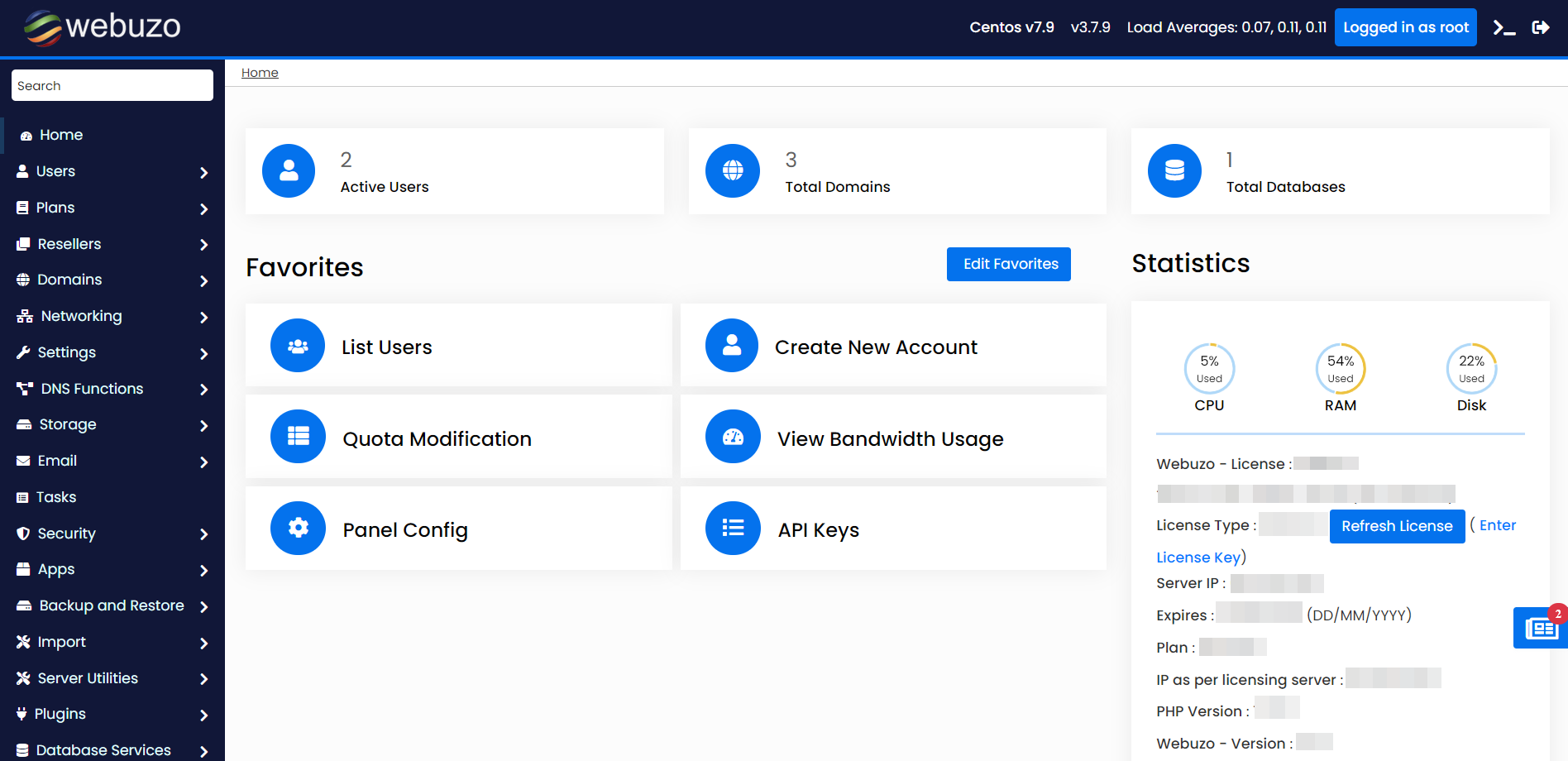
Netim, on the other hand, offers a custom control panel named Netim Direct, which includes domain and hosting management, security settings, and more. While this panel provides a consistent experience, it might take some time for users unfamiliar with custom solutions to get accustomed to. Unlike the universally recognized cPanel, Netim Direct may pose a slight learning curve, though it remains accessible and user-friendly once users are comfortable with it.
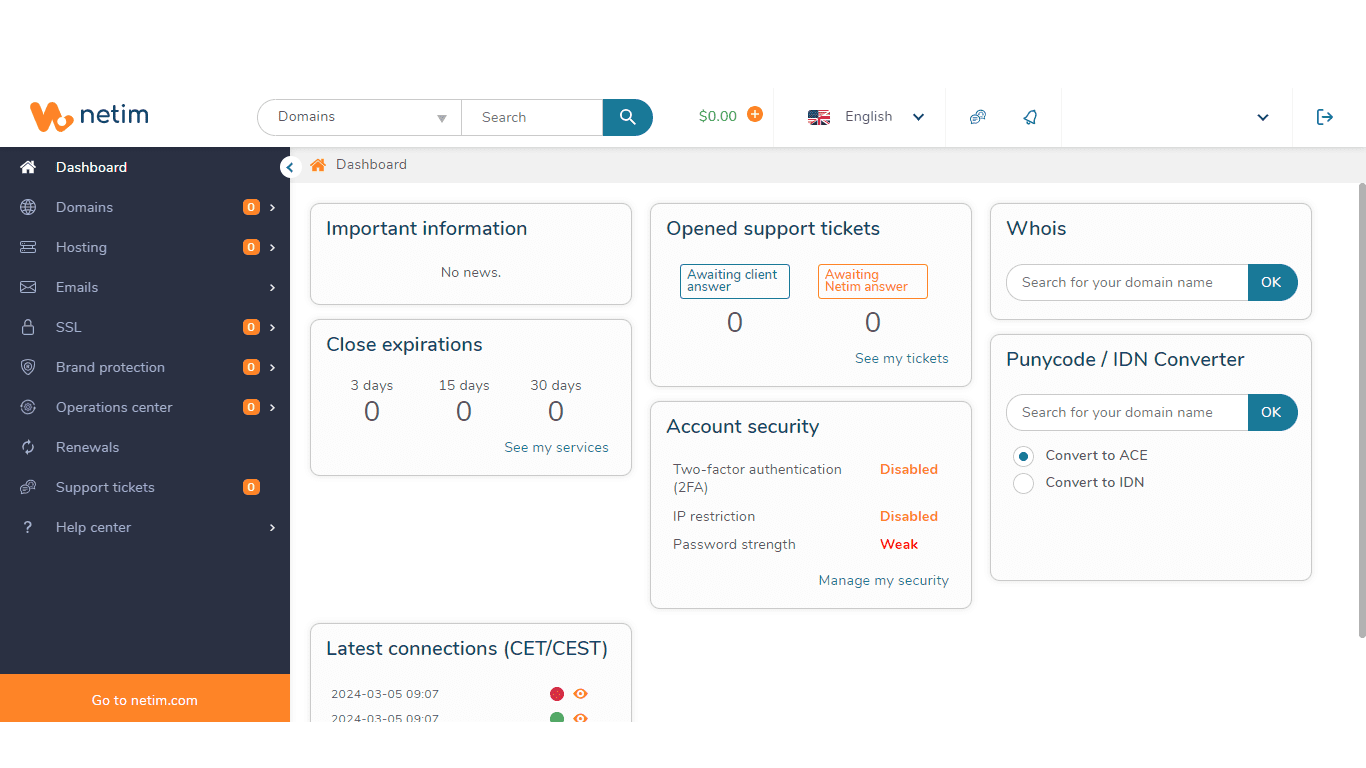
Both Namecheap and Netim provide site migration tools, but with notable differences. Namecheap offers free site migration from any cPanel-based hosting provider, leveraging the All-in-One WP Migration plugin to ensure a smooth transition. This service is entirely complimentary, which is a significant plus for those on a budget. Netim, however, provides an email migration tool and general support for switching hosts, but doesn’t specify whether website migration is free or incurs an additional fee.
Namecheap stands out with its 24/7 live chat, extensive Knowledgebase, and support ticket system for resolving issues around the clock. Their help center is filled with detailed articles and guides, making it accessible for users seeking self-help resources. Netim, meanwhile, offers a help center accessible from 8am to 6pm (UTC +2) Monday to Saturday, and detailed documentation covering domain management, hosting, and SSL certificates. Both provide robust resources, but Namecheap’s round-the-clock support can be a deciding factor for many.
User management
accessibility.
Score Components:
- Role customization (40%): Flexibility in creating and defining user roles and
permissions. - Ease of management (30%): User interface and tools for managing users.
- Access control (20%): Effectiveness of access control measures for different user
levels. - Scalability (10%): Ability to manage a growing number of users efficiently.
 0.0
0.0
 6.7
6.7
🏆 Winner
Netim: A user management system with efficient control and comprehensive features.
When comparing Namecheap and Netim in terms of user roles, permissions, and accessibility, it is clear that Netim provides a more structured and flexible experience. Netim allows administrators to define specific user roles, each with clearly delineated permissions, facilitating granular control over user access. This enhances security and operational efficiency by limiting user capabilities according to their roles. In contrast, Namecheap’s lack of specified scoring suggests that it either does not prioritize or does not effectively implement such user management features. As a result, organizations seeking detailed and precise control over user permissions and roles would find Netim considerably more advantageous.
Examining the user interfaces and tools available on both platforms, Netim stands out for its intuitive design and well-organized management tools. Netim’s interface is user-friendly, making it easy to navigate the various settings associated with user management. It offers comprehensive dashboards that provide quick insights into user activities and access controls. On the other hand, Namecheap’s interface, while functional for basic hosting tasks, does not offer the same level of sophistication or ease when managing multiple users. This difference in usability can significantly impact administrative efficiency and user satisfaction.
In terms of scalability and effectiveness in managing a growing number of users, Netim demonstrates superior capabilities. Netim’s platform is built to handle an increasing user base with minimal impact on performance. Its access control measures are robust, allowing for seamless addition and adjustment of user roles as the organization grows. This ensures that access policies remain consistent and enforceable without causing administrative bottlenecks. Conversely, Namecheap’s limitations in user role management become more apparent as user numbers increase, potentially leading to security risks and administrative challenges.
Netim user roles table:
| Role | Description | Access highlights |
|---|---|---|
| Administrator | Full control over account settings and resources. | Can manage all services, billing, and user permissions. |
| Manager | Oversee specific services and manage user access within them. | Can create and modify service settings but cannot alter billing information. |
| Technical User | Handle technical aspects of website and service setup. | Can update configurations and troubleshoot issues but restricted from billing or account-wide settings. |
| Billing User | Manage financial transactions and invoices. | Can access and update billing information, generate reports and view financial history. |
Customer support
hosting provider.
Score Components:
- Support communication channels (30%): Measures the variety of customer support types
provided (live chat, chatbot, email, phone, etc.) - Availability (20%): Assesses the availability hours for each channel, including 24/7
support options. - Technical support quality (30%): Assesses whether the provider offers comprehensive
technical support, including hardware upgrades (e.g., HDD to SSD), software installations, and web
server configuration changes. - Enterprise support (20%): Checks if there are dedicated or priority support services
for enterprise-level customers.
 8.0
8.0
 6.4
6.4
🏆 Winner
Namecheap: Offers extensive customer support options with 24/7 availability and multiple help channels to choose from.
 |
 |
|
|---|---|---|
Phone support |
||
Live chat support |
||
Chatbot |
||
Email/ticket support |
||
Enterprise support (dedicated agent, priority support) |
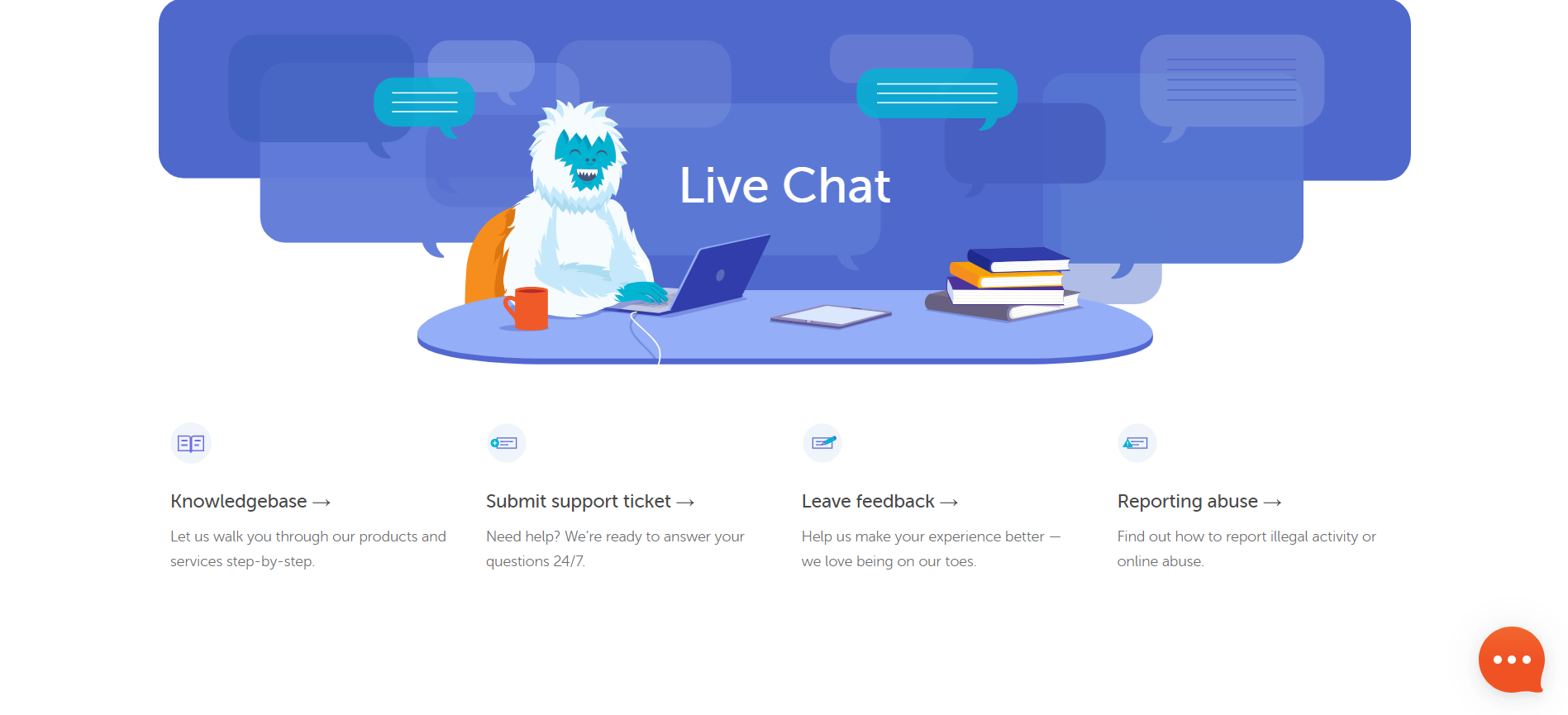
Namecheap provides a more comprehensive and user-friendly customer support experience compared to Netim. With 24/7 live chat and ticketing system, users can get immediate assistance at any time. The knowledge base is detailed and covers various topics, ensuring users have the resources they need. Free website migration and instant setup further enhance the user experience. However, the absence of phone support might be a downside for some users.

Netim, on the other hand, offers customer support in English and French, but their availability is limited to specific hours during the week. They promise a response time within 4 business hours, which may not be ideal for urgent issues. While they do have a “send a message” feature and a 30-day money-back guarantee, they lack instant chat options and a comprehensive support knowledge base, making Namecheap the more reliable choice for continuous support.
Namecheap vs Netim: User feedback
Namecheap is highly appreciated for its affordability, reliable web hosting, and excellent customer support, available 24/7 via live chat. Users commend the inclusion of free SSL certificates and quality cPanel features, making it ideal for beginners and small to medium-sized businesses. However, some dissatisfaction is noted with the shared hosting plans, which are reported to have slow loading speeds and stability issues. Additionally, there are occasional concerns about the complexity of the user interface and the lack of multilingual support.
Users generally appreciate this hosting provider for its competitive domain name registration pricing and the range of features offered. Customer service is positively highlighted, particularly in contrast to other providers that often rely on automated responses. However, some users find the user interface and experience subpar, making it difficult to navigate the site. Overall, the service is praised for its reliability and organizational tools, especially for keeping multiple sites up and running efficiently.
Namecheap vs Netim: FAQ
Which platform is better suited for hosting WordPress websites?
Both Namecheap and Netim offer extensive WordPress hosting options with various plans and features. The choice between them would depend on specific needs such as storage, performance, and security. However, both platforms are effectively tied in this category, making either a viable option for WordPress hosting.
Which hosting service offers better security features?
Namecheap provides a diverse range of SSL certificates and advanced protection features like eAccelerator and xCache, along with various email authentication systems. Netim includes Let’s Encrypt SSL certificates and focuses on Anti-DDoS services and a Web Application Firewall (WAF). While both offer robust security measures, Namecheap’s granular choices and additional layers give it an edge.
What are the major differences in pricing and value between Namecheap and Netim?
Namecheap offers diversified shared hosting plans starting from $1.98/mo, with free SSL, domain names, and website migration. Netim has a unique Lite plan that is free but limited in resources, with paid plans starting at €1.50/mo. Both providers offer WordPress-specific plans, but Netim’s pricing is more accessible, while Namecheap offers more comprehensive features.
Which hosting service offers more scalability options for growing websites?
Namecheap allows for straightforward upgrading of plans from shared hosting to powerful VPS and dedicated servers, offering significant expansion in disk space and bandwidth within each tier. Netim also relies on plan upgrades for scalability but lacks comprehensive details on dedicated server options. Namecheap’s variety of scalable options makes it more suitable for growing websites.
What are the differences in the control panels offered by each hosting service?
Namecheap uses cPanel for most of its hosting solutions, except for EasyWP, which has a customized dashboard designed for WordPress site management. Netim offers a custom control panel named Netim Direct, which includes domain and hosting management. While cPanel is universally recognized and user-friendly, Netim Direct provides a consistent experience with a slight learning curve for new users.
The making of this blog
We followed a clear, step-by-step process to write and research this article.









